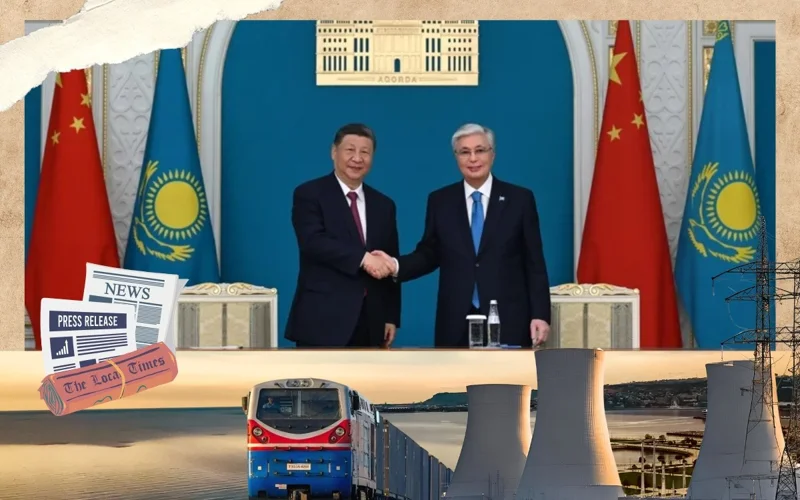Foreign media on Kazakhstan:Xi works to cement Beijing’s ties with Central Asia during Kazakhstan visit; Kazakhstan emerges as key overland gateway for China-Europe trade
Based on recent developments, including strengthened ties between Beijing and Central Asia, China’s CNNC leading a separate consortium for Kazakhstan’s first nuclear power plants, and Kazakhstan’s emergence as a key overland gateway for China-Europe trade, Kazinform News Agency presents a weekly review of Kazakhstan’s coverage in foreign media.

The Globe and Mail: Xi works to cement Beijing’s ties with Central Asia during Kazakhstan visit
Chinese President Xi Jinping has arrived in Kazakhstan, reaffirming Beijing’s ambitions to expand its influence across Central Asia and deepen bilateral ties with resource-rich regional states, reports the Globe and Mail.
On the sidelines of a summit in Astana, President Xi held closed-door meetings with the leaders of Kazakhstan, Kyrgyzstan, Tajikistan, Turkmenistan, and Uzbekistan. The visit came amid rising global tensions, with G7 leaders convening in Canada to discuss countering China’s growing geopolitical and economic clout.
In a pointed comment on global affairs, Mr. Xi condemned recent escalations in the Middle East, saying China “deeply regrets” the violence. “We oppose any actions that infringe upon the sovereignty, security or territorial integrity of other countries,” he said, following a G7 statement supporting Israel.
Kazakhstan holds special symbolic value in China’s foreign policy. It was here in 2013 that Xi first proposed the Belt and Road Initiative (BRI), which now includes over 145 countries. Central Asia remains a cornerstone of BRI, with large-scale infrastructure projects linking China to the region. Trade volumes hit a record $127 billion last year, according to China’s Foreign Ministry.
Analysts highlight that China’s push into Central Asia aligns with its goals to stabilize western regions like Xinjiang. “A primary objective in these neighbouring states is to foster a predictable and stable political environment,” said Temur Umarov of the Carnegie Russia Eurasia Center.
Reuters: China’s Xi signs treaty to elevate ties with Central Asia
Chinese President Xi Jinping signed a landmark treaty with Central Asian leaders on Tuesday, pledging deeper cooperation in trade, energy, and infrastructure as Beijing expands its influence in the region, Reuters reports.
At a summit in Astana, Xi and the presidents of Kazakhstan, Kyrgyzstan, Tajikistan, Turkmenistan, and Uzbekistan endorsed a treaty of “permanent good-neighbourliness and friendly cooperation,” Chinese state media reported. This marks the second such summit, timed once again alongside G7 meetings.
“Trade wars and tariff wars produce no winners, and unilateralism, protectionism, and hegemonism are bound to harm both others and oneself,” Xi said in his address. “China is ready to work with Central Asian countries to safeguard international justice, oppose hegemonism and power politics.”
Xi pledged 1.5 billion yuan (approx. $208 million) in grants for development projects and urged greater collaboration in trade, minerals, and agriculture. China’s growing role in Central Asia has accelerated since the start of Russia’s conflict with Ukraine.
In separate talks, Xi called for boosting gas cooperation with Turkmenistan and expanding links in law enforcement and transport across the region. “Both sides should expand the scale of natural gas cooperation, explore cooperation in non-resource fields, and optimize trade structure,” he told Turkmen President Serdar Berdymukhamedov.
China’s trade with Central Asia hit a record 286.42 billion yuan in the first five months of 2025, up 10.4% year-on-year, according to Chinese Customs.
Euronews: Kazakhstan enlists Russia and China to build first nuclear power plants since Soviet era
Kazakhstan has selected Russia’s Rosatom and China’s CNNC to lead separate consortiums for the country’s first nuclear power plants, marking its return to nuclear energy after more than two decades, Euronews reports.
The decision follows a national referendum last October in which nearly 70% of voters approved the construction of nuclear facilities - a move strongly backed by President Kassym-Jomart Tokayev. “To not remain on the sidelines of global progress, we must use our competitive advantages,” Tokayev said, pointing to Kazakhstan’s vast uranium reserves.
Rosatom will lead the first project, which includes two VVER-1200 Generation 3+ reactors. Rosatom CEO Alexei Likhachev called it “the most advanced and efficient design in the world.” The project is expected to strengthen Kazakhstan’s energy security, reduce reliance on coal, and create thousands of jobs.
Kazakhstan, one of the world’s top uranium producers, has had no nuclear power since the closure of the BN-350 reactor in 1999. The new plants are part of a broader strategy to address rising electricity demand and frequent power shortages, while lowering carbon emissions.
China’s CNNC will head a second plant under a separate agreement. “China definitely has all the necessary technologies and a full industrial base, so our next priority is cooperation with China,” said Almasadam Satqaliev, chairman of Kazakhstan’s atomic agency.
By involving both Rosatom and CNNC, Astana aims to balance strategic interests, strengthening ties with both Moscow and Beijing while diversifying technology and investment.
The Times of Central Asia: Kazakhstan emerges as key overland gateway for China-Europe trade
According to the Times of Central Asia, trade between China and Central Asia reached $95 billion in 2024, with Kazakhstan accounting for nearly half, Deputy Prime Minister Serik Zhumangarin said at the Second Meeting of the Central Asia-China Business Council in Astana on June 17.
Kazakhstan–China trade hit a record $44 billion, and both countries aim to double this in the coming years. Zhumangarin noted Kazakhstan’s key role as a major transit hub, with over 80% of China’s overland cargo to Europe passing through its territory.
Cargo along the Trans-Caspian International Transport Route (TITR), or Middle Corridor, surged by 60% in 2024 to 4.5 million tons. The volume is projected to reach 10 million tons by 2030. The TITR connects China and Europe via Central Asia, bypassing Russia.
Kazakhstan Temir Zholy reported 14.2 million tons of freight between China and Kazakhstan in the first five months of 2025, up 11% year-on-year.
Logistics infrastructure also saw a boost with the June 10 launch of the Zhetysu container terminal in Almaty. The facility, jointly built with China, is set to become a key consolidation and distribution hub along the Middle Corridor.
Zhumangarin also highlighted digital trade as a growing area of cooperation, citing Kazakhstan’s presence on platforms like Alibaba and JD.com. He confirmed interest in joining China’s pilot zone for Silk Road e-commerce to strengthen regional digital connectivity.
Euronews: Kazakhstan launches Caspian Sea Research Institute amid environmental crisis
In this episode of Modern Nomads by Euronews, the author turns our focus to the Caspian Sea. Shared by five coastal countries - Russia, Azerbaijan, Iran, Turkmenistan, and Kazakhstan - this regional treasure is facing a critical decline in sea levels.
Over the past two decades, the Caspian Sea level has dropped by more than two metres, putting local communities and ecosystems at risk. Scientists predict an even sharper decline in the years ahead.
Ecologists point to climate change as a major reason, particularly its impact on the Volga River - which flows through Russia and provides around 85% of the Caspian’s inflow.
Experts stress the urgent need for regional cooperation, including the long-standing but largely inactive Tehran Convention, created to protect the Caspian environment and promote sustainable use of its resources.
In response to the environmental crisis, the Kazakh government is launching the Caspian Sea Research Institute - a key step toward understanding the problem, protecting the endangered Caspian Sea, and preserving the region’s fragile ecosystem.
Chinadaily.com.cn: Kazakhstan is acing its youth tennis development
Kazakhstan has emerged as a rising force in global tennis, hosting major tournaments and producing top-tier talent, Chinadaily.com.cn reports. Elena Rybakina, the 2022 Wimbledon champion, has become a household name, while Alexander Bublik made history at Roland Garros as the first Kazakh man to reach a Grand Slam quarterfinal.
Junior players are also making headlines. Kazakhstan placed fifth at the 2024 Junior Davis Cup, defeating four-time champion France twice. Rising star Amir Omarkhanov reached No. 4 in the ITF junior rankings and has already made strides at the professional level. Sonja Zhiyenbayeva and Zangar Nurlanuly have also delivered strong results, alongside award-winning 14-year-old Ansar Niyetkaliyev.
In 2024, six Kazakh juniors ranked in the ITF top 100 and seven in Europe’s U14 top 100-surpassing even traditional tennis powers like Italy. All were born and trained in Kazakhstan under a system driven by the Kazakhstan Tennis Federation (KTF), led since 2007 by Bulat Utemuratov.
Since then, 38 tennis centers with over 360 courts have been built, and court costs dropped from $50 to $10 per hour. Youth participation surged from 900 to 30,000, thanks to grassroots programs like “Tennis Under 10.”
To support elite development, the KTF invests in coaching, competitions, and talent scouting. Over 140 juniors currently receive support, with top prospects receiving up to $40,000 per year in training resources. Kazakhstan aims to build a generation of world-class players ready to compete at the highest levels, from the Davis Cup to the Olympics.
You can read last week’s weekly digest here.
